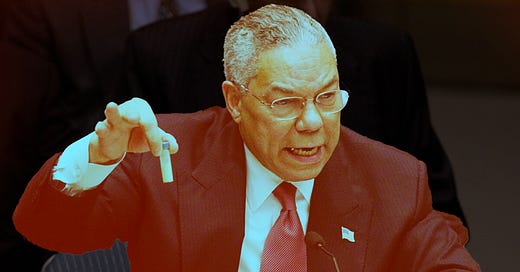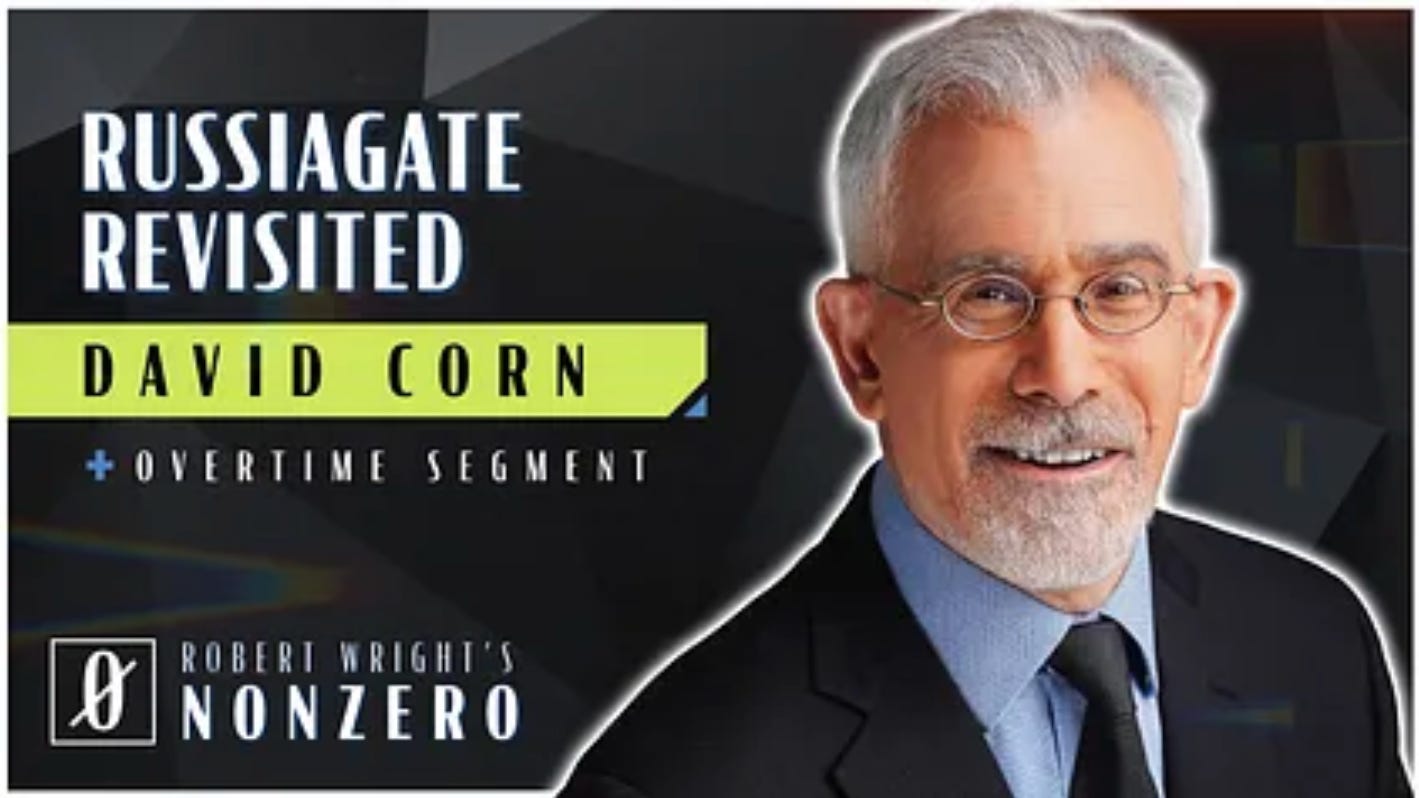Iraq 20 years later: Bush’s lies weren’t the problem
Plus: DeSantis the dove? Is Xi trying to solve Russia-Ukraine? Not-so-OpenAI – and more!
“Bush lied, people died” is a common takeaway from the Iraq War, which began 20 years ago this weekend. But it’s a misleading takeaway, one that obscures important lessons of the war and shields from accountability influential Americans whose poor judgment helped get hundreds of thousands of people killed.
It’s of course true that the Bush administration claimed falsely that Saddam Hussein had active nuclear, chemical, and biological weapons programs. And it’s true that lots of American politicians, think tankers, columnists, and assorted other opinion leaders believed these claims and backed a disastrous war.
But here’s the thing: Even if those claims had been true, supporting the invasion of Iraq still wouldn’t have made sense.
The fog of time makes it easy to lose sight of one of the most amazing facts about that war: In order to invade Iraq and start looking for weapons of mass destruction, the US had to first kick out UN inspectors who were in Iraq looking for weapons of mass destruction.
And they’d been looking intensively! Over the previous four months they had inspected more than 500 sites and found no WMDs and no signs of a WMD program.
Given that those inspected sites included the sites US intelligence agencies had deemed most likely to yield paydirt, this result—zero-for-500—suggested to the attentive observer that information coming from the US government about Saddam Hussein’s activities was not to be trusted.
But let’s leave that aside. Suppose the US government hadn’t been thus discredited—suppose that on the eve of the invasion there was still good reason to think that WMDs were out there somewhere. Why not let the UN inspectors—who had been allowed by the Iraqi government to inspect every site they had asked to inspect—keep looking? There just isn’t an answer to this question that holds water.
So it won’t do for American politicians and opinion leaders to say they supported the invasion of March 19, 2003 because they believed the administration’s claims about WMDs. Supporting the invasion made no more sense if they believed those claims than if they didn’t.
One source of frustration to those of us who opposed the invasion is that it was followed by roughly zero accountability. The American think tanks and media outlets whose luminaries led their country into a catastrophic war continued, in its aftermath, to be run and staffed by those luminaries. Indeed, some luminaries were elevated to new heights.
Maybe this lack of turnover in the US foreign policy establishment helps explain some foreign policy mistakes that have accumulated in the meanwhile, such as: (1) a disastrous regime change war in Libya (begun under the seductive guise of a limited humanitarian intervention that carried UN Security Council approval); (2) the decision by the US and some of its friends in the Middle East to flood Syria with weapons, turning what would have been a brutal but finite crackdown into an epic, massively lethal, and widely destabilizing civil war that failed to accomplish the goal of regime change; (3) a mindless and ever-expanding sanctions policy that continues to bring pointless suffering to people in Cuba, Venezuela, Syria, and Iran, among other places.
Even the Ukraine war, though started by Russia, may have a kind of connection to continuity between the pre-Iraq-War and post-Iraq-War American foreign policy establishment. There’s no way of knowing for sure why the Biden administration refused to negotiate seriously with Russia in an attempt to head off the invasion of Ukraine, but one reason may have been the knowledge that success in this endeavor would have been greeted by a chorus of foreign policy elites alleging Munich-style appeasement.
And one reason such a chorus was assured was because the character of the choir hadn’t changed after the Iraq War; supporting the most disastrous US intervention since Vietnam wasn’t considered a blemish on a foreign policy elite’s resume. Which in turn was in part because “I supported the war because I believed my president was telling the truth” was taken as a valid excuse. Even though it made no sense.
The near-hysteria that pervaded American discourse about Saddam Hussein in 2002 and early 2003 has echoes in current discourse about China and, to some extent, Russia. So it’s important to remember that there are at least two lessons of the Iraq War. One, to be sure, is the famous one: be skeptical of things a hawkish administration (like the current one) says about adversaries. The other, which may sound easy but is actually hard, is: try to stay calm and think clearly even if that’s not what the luminaries are doing.
David Corn taped a Nonzero Podcast conversation this week that didn’t lack variety. It covered, among other things, Russiagate, the Ukraine war, Buddhism, and meditation. That episode won’t air until next week, but we’re giving early access to paid subscribers, who can watch or listen to the conversation here or find it in their podcast feed (to set that up, just go to the linked post, click the “Listen on” button, and follow the instructions).
NZN’s graph of the week provides more reason to think that many nations don’t share the western world’s view of Russia:
Is Chinese leader Xi Jinping trying to start a contest with Joe Biden for the title of world’s best diplomat?
Last week China turned heads by brokering détente between longtime rivals Iran and Saudi Arabia, and this week the Wall Street Journal reports that Xi plans to speak with Volodymyr Zelensky for the first time since Russia’s invasion—probably not long after meeting Vladimir Putin in Moscow next week. The Zelensky meeting would take place by video and would “reflect Beijing’s effort to play a more active role in mediating an end to the war in Ukraine,” according to anonymous sources for the Journal story.
Even before the Journal story broke, Stephen Walt wrote in Foreign Policy that China’s Saudi-Iranian initiative “highlights an important dimension of the emerging Sino-American rivalry: Will Washington or Beijing be seen by others as the best guide to a future world order?”
This week OpenAI, maker of the language-generating and buzz-generating ChatGPT, announced the release of GPT-4. Compared to GPT-3.5—the “large language model” that powered the original ChatGPT—the new version is “more reliable, creative, and able to handle more nuanced instructions,” OpenAI said.
And there was another, less advertised difference between the two iterations of GPT—their degree of transparency. The company is declining to divulge what data GPT-4 was trained on and various other things about its inner workings. This stance has drawn criticism, in part because back in 2015—when OpenAI was founded as a pure non-profit, before it had sprouted a for-profit subsidiary—its founders said transparency was central to its mission. (Hence the name.)
Ilya Sutskever, OpenAI’s chief scientist, said the new opaqueness would help keep users safe and help keep the company’s competitors in the dark. And he admitted that “the safety side is not yet as salient a reason as the competitive side.” But he said that would change. “These models are very potent and they’re becoming more and more potent. At some point it will be quite easy, if one wanted, to cause a great deal of harm with those models. And as the capabilities get higher it makes sense that you don’t want to disclose them.”
On the other hand: The selection of training data can give an AI an ideological spin—so should the public be allowed to examine that selection and debate it?
A related question was raised by Ben Schmidt of Nomic AI:










